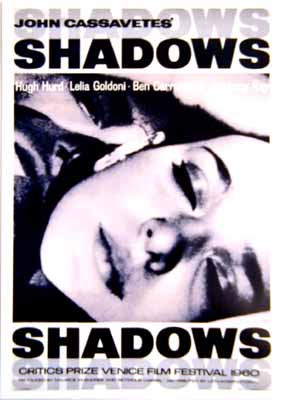<Back to Index>
- John Cassavetes' Shadows, 1959
PAGE SPONSOR

Shadows, a docufiction, is an improvisation inspired film about interracial relations during the Beat Generation years in New York City, and was written and directed by John Cassavetes. The film stars Ben Carruthers, Lelia Goldoni, Hugh Hurd, and Anthony Ray (Tony in the film). Many film scholars consider Shadows one of the highlights of independent film in the U.S. In 1960 the film won the Critics Award at the Venice Film Festival.
Cassavetes shot the film twice, once in 1957 and again in 1959. The second version is the one Cassavetes favored. Although he did screen the first version, he lost track of the print, and for decades it was believed to have been lost or destroyed. The 1957 version was intended to have the jazz music of Charles Mingus on the soundtrack, but Mingus failed to meet various deadlines set by Cassavetes. The contributions of saxophonist Shafi Hadi, the saxophonist for Mingus's group, proved to ultimately be the soundtrack for the film.
In 2004, after over a decade of searching, Cassavetes scholar and Boston University professor Ray Carney announced his discovery of the only print of the original version of the film, found in a box on the subway before being bought with some other "lost and found" objects. The film Carney managed to find was a pristine copy that apparently had only been screened two or three times before it was lost. Carney has posted three video clips from Shadows I for viewing on his website to verify the film's condition and indicate the presence of a complete credits sequence, which demonstrates that the version he possesses is a final version, not a rough assembly.
Film critic Leonard Maltin calls Cassavetes' second version of Shadows "a watershed in the birth of American independent cinema". The movie was shot with a 16 mm handheld camera on the streets of New York. Much of the dialogue was improvised, and the crew were class members or volunteers. The jazz - infused score underlines the movie's Beat Generation theme of alienation and raw emotion. The movie's plot features an interracial relationship, which was still a taboo subject in Eisenhower era America.
In 1993, Shadows was selected for preservation in the United States National Film Registry by the Library of Congress as being "culturally, historically, or aesthetically significant".